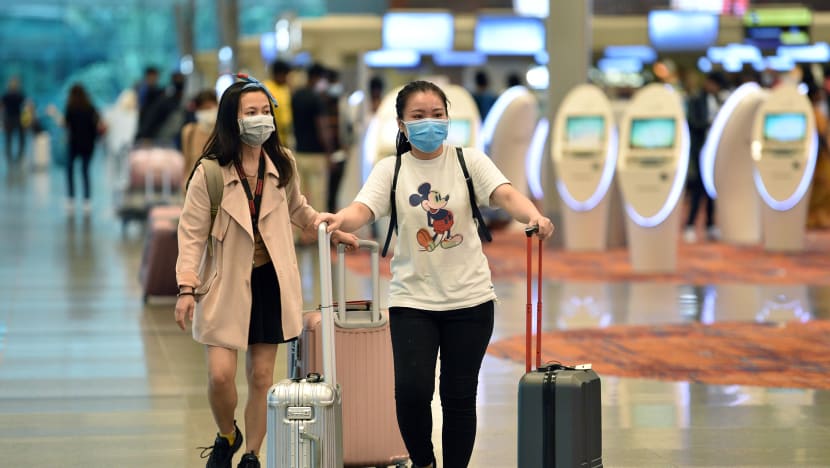COVID-19: Safe distancing on aircraft and higher ticket prices could be 'new normal' for industry, say analysts

Travellers at the departure hall in Changi Airport Terminal 1. (Photo: Jeremy Long)
SINGAPORE: Imagine travelling to your holiday destination on a plane that is only half filled with passengers, served by cabin crew wearing masks.
That could be the “new normal” for airlines which are likely to continue with safe distancing measures even after the COVID-19 outbreak dies down, said aviation analysts.
Already, budget carrier Jetstar Asia, which resumed partial operations last Tuesday (Apr 21), said no more than 112 seats will be available on each passenger flight. That’s about 60 per cent of capacity, as part of efforts to ensure safe distancing on board.
Passengers and crew members will be required to wear masks.
Onboard services such as meals will also be cut back, with only water served on flights.
READ: Jetstar Asia to resume some flights to Manila, Bangkok, Kuala Lumpur
Several other airlines, such as Air New Zealand, KLM and United Airlines, are also taking steps to ensure safe distancing, for example, by blocking off certain seats from being purchased.
“It's all very early days as airlines try to figure out the new norm,” said independent aviation analyst Brendan Sobie, noting that blocking seats is a common measure at the moment.
However, seat blocking has had little direct impact on airline revenue right now, as most flights are operating at “well below 50 per cent” of passenger capacity anyway, Mr Sobie pointed out. Cargo is currently the main revenue source for airlines, he added.
END OF CHEAP TRAVEL?
According to International Air Transport Association (IATA) director-general Alexandre de Juniac, the enforcement of safe distancing on aircraft would require at least one-third of plane seats to remain empty.
Airlines would have to raise ticket prices by at least 50 per cent in order to turn a minimum profit, he suggested at a briefing on Apr 21.
“It means two things - either you fly at the same price, selling the ticket at the same average price as before and then you lose an enormous amount of money, so it’s impossible to fly for any airline. Or you increase the ticket price for a similar product by at least 50 per cent and then you are able to fly with a minimum profit,” he said.
“And so it means that if social distancing is imposed, cheap travel is over.”
READ: COVID-19: AirAsia trials PPE suits for cabin crew
IATA’s prediction on costs being driven up is “absolutely correct”, Mr Shukor Yusof, founder of aviation consultancy Endau Analytics, told CNA.
“Like post-9/11, where security needs rose dramatically, there will be costs involved in imposing additional new requirements before boarding an aircraft,” he said.
Mr Shukor added that the need for safe distancing amid concerns about COVID-19 also poses “pertinent questions” about the business model of budget carriers, which typically pack as many passengers as possible on board in order to make money.
“Will 180 people feel comfortable being together for two to three hours in an aircraft?” he said.
“Until and unless a vaccine is found - and that's at least a year away - low-cost airlines will struggle to fill the planes and therefore, won't make money flying passengers that can't allow carriers to break even,” he added.
“If they don't make money, they can't sustain the business.”
READ: Singapore aviation industry 'extremely vulnerable' to fallout from COVID-19, say experts
Assistant Professor Terence Fan, a Singapore Management University economist who specialises in transport, believes that airlines may continue to offer cheaper tickets for some time after the current crisis dies down, to encourage more people to fly.
He does not see safe distancing or other similar measures continuing in the longer term, noting airlines are likely to want to attract more passengers to fly once demand for travel picks up again.
SAFE DISTANCING A POSSIBLE SELLING POINT: ANALYST
While it is difficult to say what the new normal might be for airlines after the world emerges from COVID-19, Assistant Professor Fan said that given the current concerns about the coronavirus, airlines may simply introduce safe distancing as a selling point to get back passengers.
“At this point, airlines are very desperate to get people on flights. This social distancing is one way to get them back,” he said.
Airlines may be taking a close look at their competitors to see what sort of measures attract passengers, Assistant Professor Fan noted, adding this could include health checks such as those conducted by Emirates.
Last week, Emirates became the first airline to conduct on-site COVID-19 testing for passengers, with the carrier working with the Dubai Health Authority to conduct tests for all passengers on a repatriation flight from Dubai to Tunisia.
Airports such as Tokyo’s Narita International Airport and Hong Kong International Airport have also introduced COVID-19 testing for passengers from "high-risk" destinations.
"This might be the new normal, at least for the near-term," said Mr Shukor. Such measures could be in place for air travel for the next two or three years, he suggested.
However, Mr Shukor said that passengers may also be put off by measures such as the need to wear masks, and this may deter both leisure and business travellers, which will have a "negative result on an airline's economics".
This is likely to have an impact on jobs in the industry as well, he added.
"Things remain very fluid in the aviation industry but massive job losses are a given now, on board the plane as well as on the ground at airports."
With travel restrictions in place in many countries, IATA estimates that global airline losses will hit US$314 billion this year.
Last week, Virgin Australia, which is partly owned by Singapore Airlines, announced it had entered voluntary administration due to the impact of the coronavirus.
BOOKMARK THIS: Our comprehensive coverage of the coronavirus outbreak and its developments
Download our app or subscribe to our Telegram channel for the latest updates on the coronavirus outbreak: https://cna.asia/telegram















